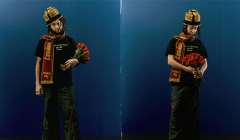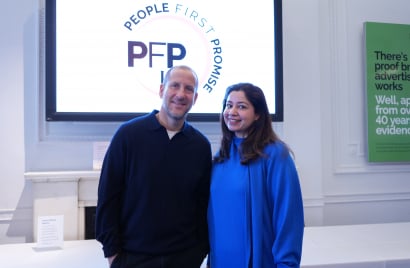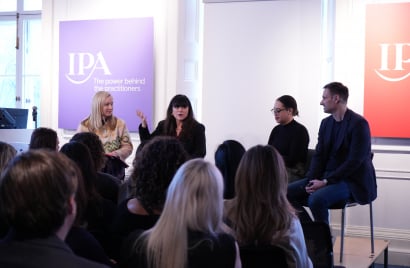
Highsnobiety showcases the city’s culture for London Fashion Week
Partnering with the British Fashion Council and iconic London brands, the experiential campaign increased brand awareness of the media brand.

The IPA’s gathered industry leaders to consider how to prioritise people and their wellbeing in an increasingly polarising world.

IPA President, Josh Krichefski, launched his People First Promise in January last year calling on advertising agency leaders to demonstrate their commitment to their people’s mental health and wellbeing. One year on, in an increasingly polarising environment where DEI rollbacks are rife, the People First Promise has never been more relevant.
In an ever-evolving landscape, Krichefski maintains that the success of the creative industries is driven by people. His People First Promise has been designed to drive measurable change and hold the industry to account. With over 100 sign-ups in the first year, he aims to double this figure in 2025. Krichefski strives to bring the industry together by pushing wellness to the top of the agenda and raising the industry’s overall standard of happiness.
A breakfast event at the IPA hosted by Krichefski invited leaders to delve into the initiatives their businesses have implemented to better support the mental health and well-being of their staff. With companies which had been awarded ‘People First’ accreditation by the IPA sharing actionable insights as to how we can support one another.
2025 is well and truly testing the notion that a continuous bad news cycle can have a damaging impact on our mental health. Between back-to-office mandates, Trump's attack on DEI and post-budget pessimism, business news alone is enough to create a feeling of dread.
In these increasingly difficult times, Carolyn Stebbings, Chief Operating and Inclusion Officer at RAPP and Ivana Kosorok, Managing Partner at Publicis London discussed the importance of leading with kindness and looking after our own mental health to be able to support those around us.
For Kosorok making the space for wellness comes in the form of yoga and connecting with nature. She advocated for just 18 minutes at the start of the day to compound wellness and form healthy habits to be able to take on the day with a more measured outlook.
“Mental health is an inseparable part of who we are,” says Kosorok. She shares that where emotions are contagious, leaders must take an ‘oxygen mask’ approach, taking time to look after their own mental well-being to build a community of acceptance and approachability.
“Everybody wants to feel seen and heard,” says Kosorok, adding that: “We are all human and carry our own loads.” By looking for ways to make small changes and creating a community of psychological safety, even the most senior leaders can break down the barriers to creating an inclusive culture by being vulnerable.
A session hosted by Nicky Kemp, Editorial Director at Creativebrief with, Kieran Kent, CEO at Propeller, Fleur Stoppani, COO at Mindshare UK and Kandice Quain, Media Manager at Bray Leino explored why a People First approach matters, The panel shared actionable insights for adapting to a workplace in transition.
Pointing to the importance of feedback and listening to the needs of employees to shape a workplace that works for them, Quain shared how employee resource groups (ERGs) have been at the heart of Bray Leino’s DEI efforts. Through anonymous issue raising that gives employees the freedom and confidence to speak their minds the company has successfully created a space where employees have a voice. While building ERGs around cultural pillars and listening to feedback has also been key to driving change in their organisation.
The importance of listening and learning was brought to life by Stoppani who shared that via an International Women’s Day event the organisation learned that their office space could make easy actionable changes to better support neurodiverse talent. By listening, Mindshare has been able to make practical changes to make their space more inclusive. From dimming lights to providing noise-cancelling headphones and fidget toys, the organisation can now use its office space in a more efficient and productive way that works best for its talent.
In a client-servicing industry, Kent stresses that: “Happy people make for happy clients”. He believes that putting the mental health of talent first and playing to the strengths of your team is what creates the basis for great work. For Kent, retaining talent is an important priority for growth. Implementing progressive policies such as ‘work from anywhere for a month’ allows talent space to look after their wellbeing and gives working parents the means to work from home during the school holidays. Creating initiatives and social activities around the needs of your team allows people to feel as though they are heard.
At a time when DEI is being dismantled, Michael Brown, Managing Partner and Head of Insight and Research, UK & EMEA at UM Worldwide spoke with Chloe Davies, Founder and CEO at It Takes A Village Collective, and Sue Todd, Chief Executive Officer at NABS on the importance of doubling down and the business case for investing in wellbeing.
NABS’ Sue Todd pointed to the organisation’s Managers Mindsets as a free actionable training course for middle management. The training is designed to support middle managers, a group over indexing on stress, to manage with well-being in mind. Where middle managers are often promoted unsupported and struggling with new responsibilities, training can provide the practical tools to enable them to lead with kindness. NABS shared that calls to its advice line soared in 2025. However, Todd was optimistic that while people may be struggling, a growing awareness of NABS and its services have allowed the organisation to provide more practical support to the industry.
Now is a scary time for marginalised communities. Davies looked for light and shared that post-covid we have all got stronger, built communities and found ways to support one another. She urged the audience to: “Make the space to say stupid things, to learn and to grow from our mistakes.” Pointing to the fact that we are never as strong as we are in crisis, Davies urges leaders to be humble. She says that while “things might get worse before they get better” it takes courage to go first, to say when we are not OK and build each other up together.


Looks like you need to create a Creativebrief account to perform this action.
Create account Sign inLooks like you need to create a Creativebrief account to perform this action.
Create account Sign in